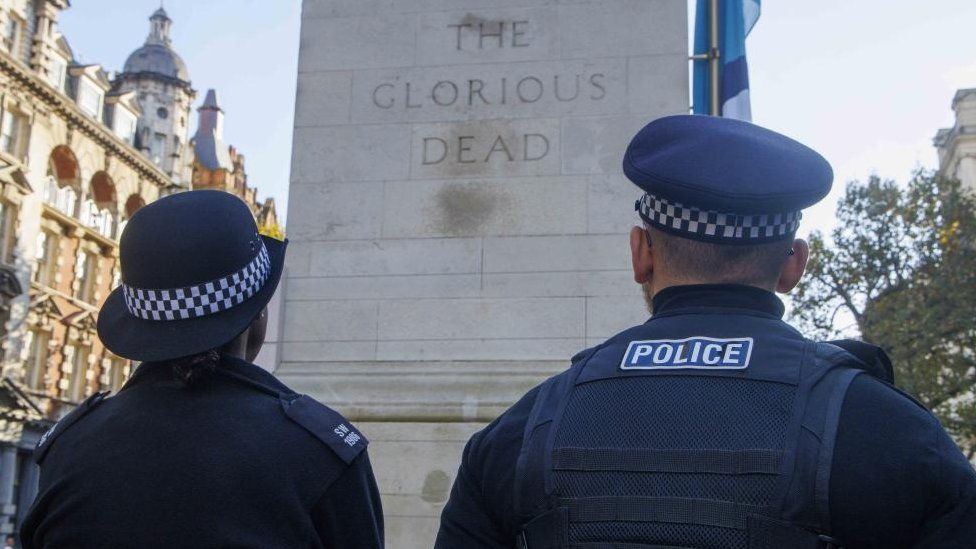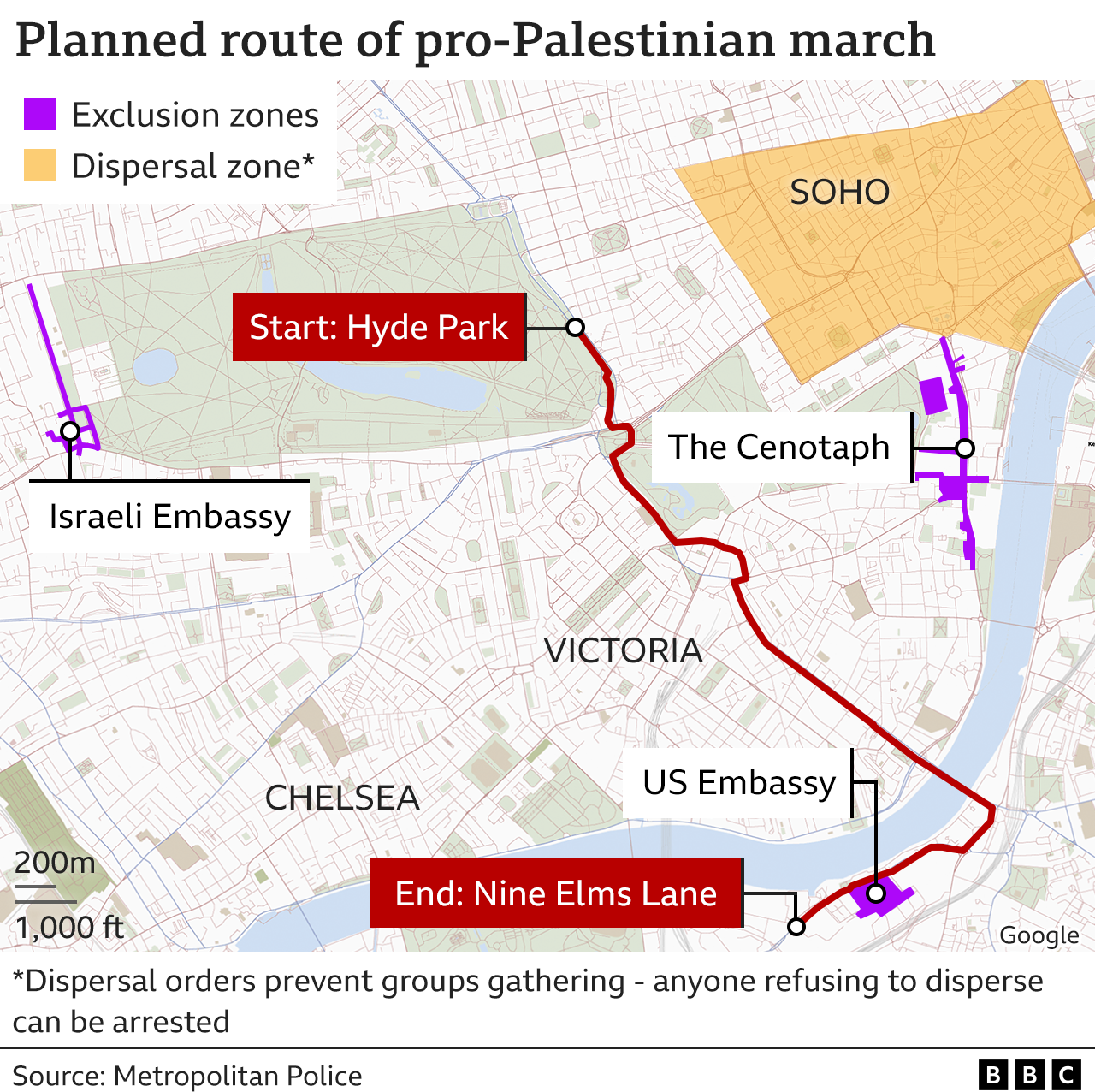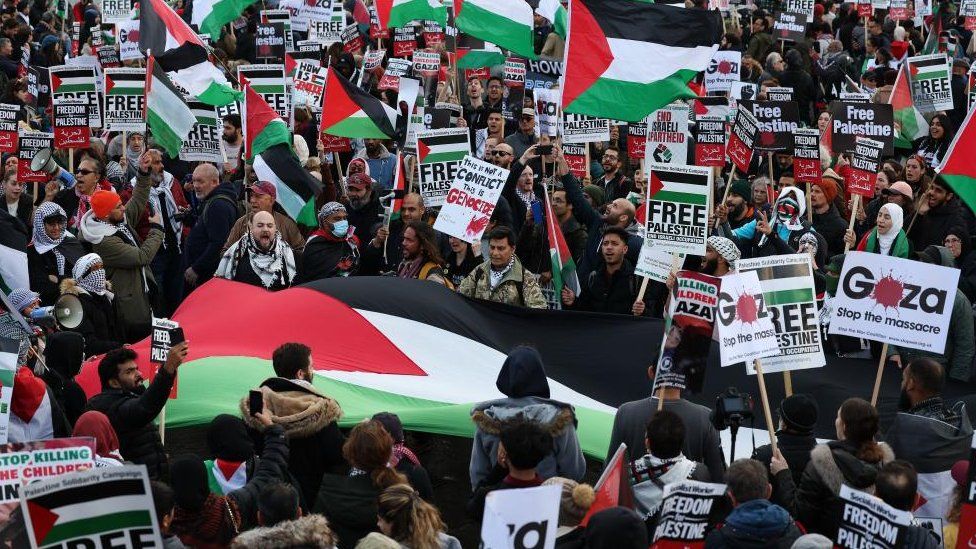The Met Police sets out how it will handle demonstrations taking place in London on Armistice Day.
 Image source, EPA-EFE/REX/Shutterstock
Image source, EPA-EFE/REX/ShutterstockThe Metropolitan Police is preparing for an unprecedented security operation ahead of a pro-Palestinian demonstration in London on Saturday.
The force expects the march – which coincides with Armistice Day – to be the largest yet, and has warned there is a risk of clashes.
Pro-Palestinian protesters gathering near the Cenotaph can be arrested under sweeping measures announced by the Met.
Rishi Sunak has repeated his view the timing of the march is “disrespectful”.
He urged protesters to be “mindful of the fear and distress in Jewish and Muslim communities” when they gather on Saturday, and said he had been given assurances police had taken all steps to ensure Remembrance services would be “safeguarded”.
In a statement on Friday, Mr Sunak said: “It is because of those who fought for this country and for the freedom we cherish that those who wish to protest can do so, but they must do so respectfully and peacefully.
“Remembrance weekend is sacred for us all and should be a moment of unity, of our shared British values and of solemn reflection.”
The Met has said it will deploy 1,850 public order officers on duty on Saturday, and another 1,375 on Sunday, as part of a “huge” security operation in order to reassure local communities.
It expects Saturday’s demonstration to be the largest since weekly pro-Palestinian marches began in early October, and warned the situation in the capital could be “challenging” and “tense”.
An exclusion zone will be in place around the Cenotaph and a large swathe of Whitehall, which the Met says will “in effect” ban pro-Palestinian protesters from these locations and goes further than the security measures usually deployed around the key Remembrance site.
A dedicated 24-hour police presence is already in place around the Cenotaph, which will remain until after Sunday’s ceremony.
The Met expects a larger number of counter-protesters – including members from far-right groups and football hooligans – to be in London compared to previous weekends, and there are concerns about the potential for clashes.
Unlike pro-Palestinian protesters, they will be allowed into Whitehall, with the plan centred on keeping the two groups apart.
Deputy Assistant Commissioner Laurence Taylor, who is leading the operation, said he is concerned breakaway groups could “seek each other out”.
He told reporters it is “likely we will see police having to use force” to prevent serious disorder.

The Palestine Solidarity Campaign, which has organised the march, has repeatedly stressed their route does not go past the Cenotaph, and has rejected the Met’s public appeals to postpone.
No major protest is scheduled to take place on Remembrance Sunday. The demonstrations have taken place on successive Saturdays.
But on Friday the force reiterated concerns about disruptive splinter groups, saying their “behaviour has been escalating and becoming more violent and distressing to the public” as the weekly protests have continued.
Other security measures announced by the Met include:
- Exclusion zones around the US and Israeli embassies
- Extra powers to stop-and-search, and compel people to remove masks
- Plans to prevent a “convoys of cars” carrying pro-Palestinian protesters, which is expected to arrive from elsewhere in the UK, reaching Jewish communities
- Working with British Transport Police to protect poppy sellers at stations
- A “dispersal zone” in a busy central London area, preventing breakaway groups from gathering later in the day
Met Commissioner Sir Mark Rowley said earlier this week the legal threshold which would allow him to ask the Home Office for permission to ban the march had not been met. He also stressed there are no powers in UK law to ban a static demonstration.

Image source, EPA-EFE/REX/Shutterstock
The build-up to the latest pro-Palestinian demonstration in London has been dominated by a political row over Mrs Braverman’s comments about the Met in the Times newspaper.
She claimed aggressive right-wing protesters were “rightly met with a stern response”, while “pro-Palestinian mobs” were “largely ignored” – accusing the force of applying “double standards”.
It later emerged that she had defied a Downing Street request to tone the article down, including – according to the Times – a comparison between pro-Palestinian demonstrations and marches in Northern Ireland.
Critics of Mrs Braverman say she has undermined the police and potentially broken the ministerial code by not agreeing her remarks with No 10.
A source close to the Home Secretary said she met with the Met commissioner on Friday afternoon, where she “emphasised her full backing for the police in what will be a complex and challenging situation and expressed confidence that any criminality will be dealt with robustly”.
Steve Hartson, the national chair of the Police Federation – which represents rank and file officers – said it is “unacceptable” for a home secretary to “publicly attempt to tamper with the operational independence of policing”.
The prime minister has so far stood behind his Home Secretary, but Downing Street is “still looking in to what happened with [Mrs Braverman’s] op-ed”.
The Met said it had made 188 hate crime arrests since the 7 October attacks on Israel, a majority of which were for suspected anti-Semitic offences.